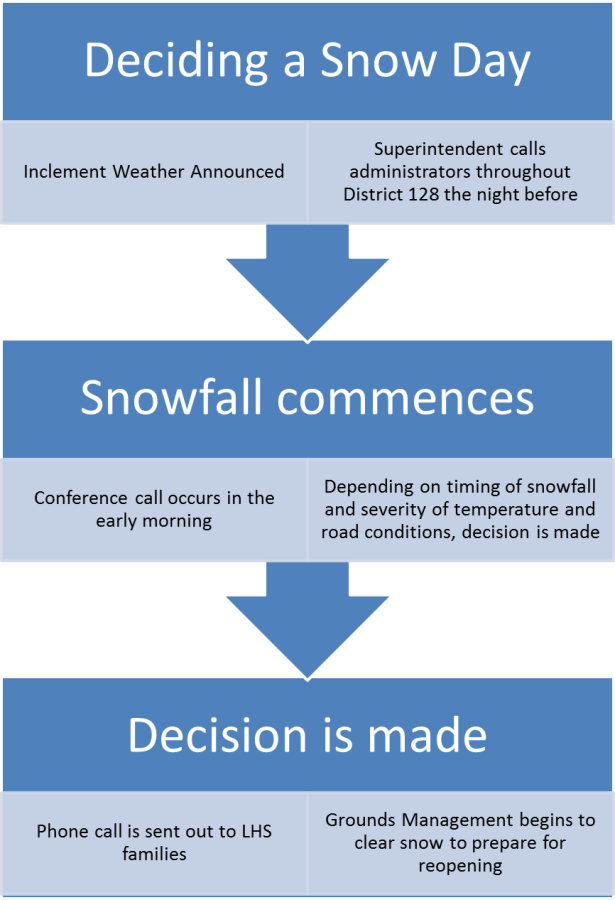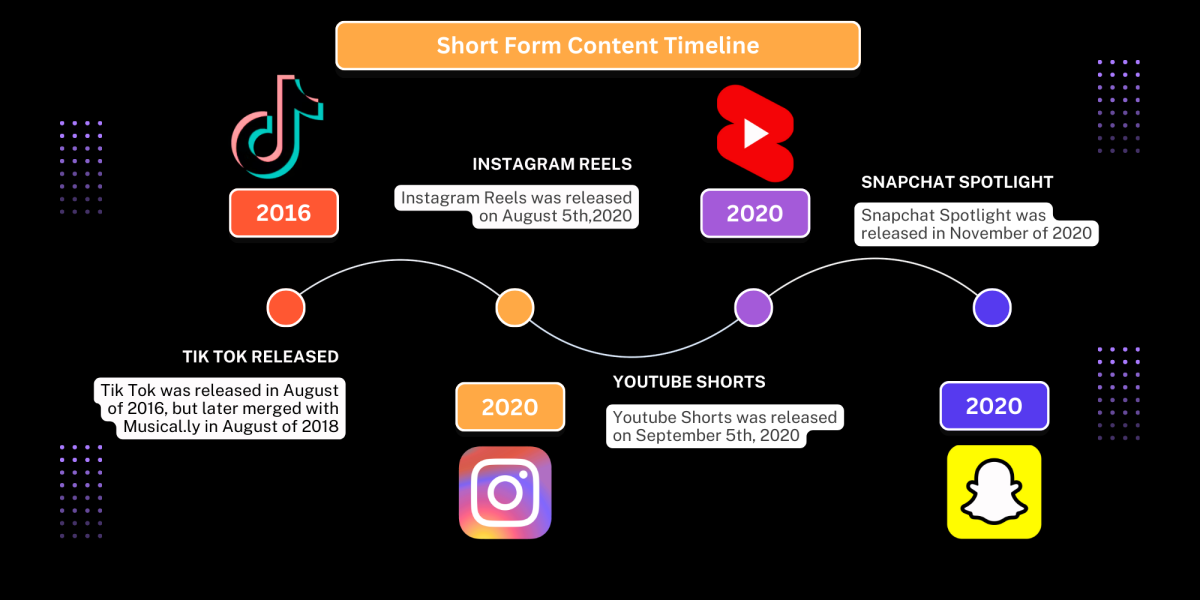Imagine a cold January morning. You wake up to see several inches of snow piled up on your driveway, the roads not in much better shape. Your first thought: How do we NOT have a snow day on today of all days?! Twitter and Facebook begin to be overpopulated with complaining tweets and posts about the snow, and students all over town disappointedly make their way to the school.
Although the decision on whether or not to cancel school is ultimately up to the District 128 Superintendent Dr. Prentiss Lea, it is much more complicated than a simple yes or no answer. There are many things that are taken into consideration when deciding whether or not to cancel school. Road conditions, wind chills, and ultimately the safety of the students, all play a part in the decision-making process.
“While I make the final decision for D128, I certainly do not make that decision alone. I work with our feeder elementary district superintendents and our district and building teams to look at all areas of impact, including, but not limited to: current weather and predicted forecasts, road and driving conditions, parking lot and sidewalk conditions, events scheduled for that day, etc.” said Dr. Lea.
“There are a lot of things that play into it. The first thing we consider is safety. Like, is it safe for kids to stand out at the bus stop? Can the buses start? Can they drive?” remarked Dr. Marina Scott, principal of Libertyville High School.
These types of questions and considerations are typically discussed at 4 a.m. the morning after a significant amount of snowfall or when there are dangerous conditions predicted.
“It’s not usually the snow, but rather getting you to school that’s the problem,” said Dr. Scott.
At 4 a.m., a conference call usually takes place between the assistant principal, neighboring superintendents, associate superintendents, the associate superintendent for finance, groundskeepers, and bus drivers to communicate with each other about the status of the weather. Sometimes, if the weather is predicted to get bad in the night-time hours, all assisting members will have a “touch base” that night, discussing the information they have at their disposal to prepare a decision for the next day.
“I conference call with the superintendents of our feeder schools the night before and/or early morning of the anticipated bad weather. In the case of really bad weather–like we had last year–we also have conversations with other Lake County high schools,” said Dr. Lea.
“Also what makes a difference is when the snow is going to come. If it’s coming in big at 6 a.m. then it’s hard to turn that around rather than if it came at 10 p.m. that night,” said Dr. Scott.
This means that if the snow comes down heavily with enough time left for a successful clearance of the roads, then school can still be held. But, if the snow comes down too close to when the school day starts, then the school has more reason to close for the day, as the roads will not be as well-cleared for the parents, students, and teachers who would be making their way to the school.
The decisions of other schools in the area are also taken into consideration. Stevenson, Lake Forest, Vernon Hills, Mundelein, as well as other schools, are all watched to see what the decision has been on their end and to see if they are cancelling or delaying school as well.
“Another factor that I think students don’t take into consideration is that when we cancel school, we have to take into account that there is a required number of days that school needs to be attendence. So, we have to be careful when we start to go beyond that requirement. We have extra days built into our calendar, otherwise you have to make them up at the end. We also consider [students’] safety, but also their education is important,” said Dr. Scott.
According to Dr. Lee, “D128 has three days that we can use for emergency days without further impacting the school calendar. If we reach a fourth emergency day, as we did last winter, then the superintendent can cancel any remaining teacher institute days (no students in attendance on an institute day) and/or teacher grading days at the end of the semester (no students in attendance on teacher grading days) to avoid adding additional days to the student attendance calendar. This option saved us last year when we had four emergency days because we were able to cancel an institute day scheduled at the end of the year, which allowed us not to have to add one extra attendance day on at the end of the year.”
Once the decision is made a mass phone call is made to every LHS student’s home notifying them about the cancellation of school that day. The system is an effective method of notification for parents and students, but it only works if accurate information is provided. The District 128 website chides in with this reminder: “The successful delivery of information is dependent upon accurate contact information for each student, so please make certain that your student’s school has your most current phone numbers.”
“In addition to using our Blackboard Connect alert system which emails and calls our school families, we also post messages on Facebook, Twitter and our school websites. As you might guess, Twitter seems to be the fastest way to reach students. We also post to cancellations.com (which feeds to the local TV and radio stations)” said Dr. Lee.
This goes back to the “polar vortex” that struck the midwest last year with its below-zero temperatures and icy winds. Last winter, Chicago picked up more than 80 inches of snow according to CBS Chicago, being only the third time in history that Chicagoans have seen that amount of snow. Though there was a tremendous amount of snow, the real problem laid in the low temperatures. It was simply unsafe for students to be walking to school in such low temperatures, leading the school administrators to cancel school on January 6th, 7th, 27th, and 28th of last year. When this is the case, the same procedures are followed as when a major precipitation is predicted, and the decision is made regarding whether or not to cancel school.
Dr Lea stressed that, “Ultimately, the number one priority is the safety of our students and staff.”
On the bright side, according to predicting meteorologists, “This [winter] will not be like last winter; we’ll get a few spring-like days to head out to the park with a light jacket even in January. The winter will start warmer and drier than normal and end on the colder, snowier side in February and March” Jill MacMath reported via Accuweather.com.
The weather that will ensue in the upcoming months will be milder than normal, and “…while we fully expect new arctic outbreaks, it appears this winter may vary from the last in terms of the persistence of cold outbreaks,” reported WGN-TV meteorologist Tom Skilling on wgntv.com.








